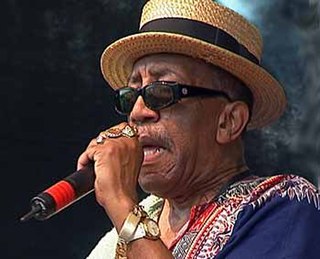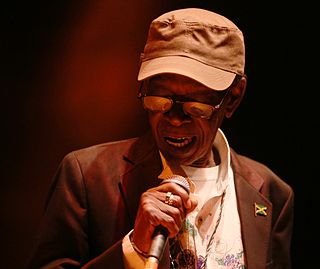Related Research Articles

Reggae is a music genre that originated in Jamaica in the late 1960s. The term also denotes the modern popular music of Jamaica and its diaspora. A 1968 single by Toots and the Maytals, "Do the Reggay", was the first popular song to use the word reggae, effectively naming the genre and introducing it to a global audience. Reggae is rooted out from traditional Jamaican Kumina, Pukkumina, Revival Zion, Nyabinghi, and burru drumming. Jamaican reggae music evolved out of the earlier genres mento, ska and rocksteady. Reggae usually relates news, social gossip, and political commentary. It is instantly recognizable from the counterpoint between the bass and drum downbeat and the offbeat rhythm section. The immediate origins of reggae were in ska and rocksteady; from the latter, reggae took over the use of the bass as a percussion instrument.
The music of Jamaica includes Jamaican folk music and many popular genres, such as mento, ska, rocksteady, reggae, dub music, dancehall, reggae fusion and related styles.
Mento is a style of Jamaican folk music that predates and has greatly influenced ska and reggae music. It is a fusion of African rhythmic elements and European elements, which reached peak popularity in the 1940s and 1950s. Mento typically features acoustic instruments, such as acoustic guitar, banjo, hand drums, and the rhumba box — a large mbira in the shape of a box that can be sat on while played. The rhumba box carries the bass part of the music.

Ernest Ranglin is a Jamaican guitarist and composer who established his career while working as a session guitarist and music director for various Jamaican record labels, including Studio One and Island Records. Ranglin played guitar on many early ska recordings and helped create the rhythmic guitar style that defined the form. He has worked with Theophilus Beckford, Jimmy Cliff, Monty Alexander, Prince Buster, the Skatalites, Bob Marley and the Eric Deans Orchestra. Ranglin is noted for a chordal and rhythmic approach that blends jazz, mento and reggae with percussive guitar solos incorporating rhythm 'n' blues and jazz inflections.
There are several subgenres of reggae music including various predecessors to the form.

Lorenzo "Laurel" Aitken was a Cuban-Jamaican singer and one of the pioneers of ska music. He is often referred to as the "Godfather of Ska".
Nerlynn Taitt was a guitarist born in San Fernando, Trinidad and Tobago, who later moved to Jamaica and became a pioneer of rocksteady music.

Montgomery Bernard "Monty" Alexander OJ CD is a Jamaican American jazz pianist. His playing has a Caribbean influence and bright swinging feeling, with a strong vocabulary of bebop jazz and blues rooted melodies. He was influenced by Louis Armstrong, Duke Ellington, Erroll Garner, Nat King Cole, Oscar Peterson, Ahmad Jamal, Les McCann, and Frank Sinatra. Alexander also sings and plays the melodica. He is known for his surprising musical twists, bright rhythmic sense, and intense dramatic musical climaxes. His recording career has covered many of the well-known American songbook standards, jazz standards, pop hits, and Jamaican songs from his original homeland. Alexander has resided in New York City for many years and performs frequently throughout the world at jazz festivals and clubs.
Derrick Morgan OD is a Jamaican musical artist who was popular in the 1960s and 1970s. He worked with Desmond Dekker, Bob Marley, and Jimmy Cliff in the rhythm and blues and ska genres, and he also performed rocksteady and skinhead reggae.

Marcus' Children is a studio album by the Jamaican musician Burning Spear, originally released in 1978 as Social Living. It was produced by Karl Pitterson and Burning Spear.

Winston Grennan was a Jamaican drummer, famous for session work from 1962 to 1973 in Jamaica as well as later in New York City through the 1970s and 1980s.
The Skatalites are a ska band from Jamaica. They played initially between 1963 and 1965, and recorded many of their best known songs in the period, including "Guns of Navarone." They also played on records by Prince Buster and backed many other Jamaican artists who recorded during that period, including Bob Marley & The Wailers, on their first single "Simmer Down." They reformed in 1983 and have played together ever since.
Joseph Abraham Gordon, better known as Lord Tanamo, was a Jamaican-Canadian singer and songwriter best known for his mento and ska work.

Cedric "Im" Brooks was a Jamaican saxophonist and flautist known for his solo recordings and as a member of The Mystic Revelation of Rastafari, The Sound Dimensions, Divine Light, The Light of Saba, and The Skatalites.

The Jolly Boys are a mento band from Port Antonio, Jamaica. It was formed in 1945 and had great commercial success in the late 1980s and 1990s among reggae and world music fans. They released a new album in 2010 Great Expectation and are currently the house band at GeeJam, a hotel in Port Antonio.
Oswald "Baba" Brooks was a trumpet player who played jazz in the 1950s with the Eric Dean orchestra and recorded during the 1960s original Jamaican ska era for producers Duke Reid, Sonia Pottinger and her husband Lindon, King Edwards, and Prince Buster.
Val Bennett was a Jamaican tenor saxophonist and jazz and roots reggae musician who began his career in the 1940s. He made a number of releases on the Island Records and Crab Records labels.

Stranger Cole, also known as StrangeJah Cole is a Jamaican singer whose long recording career dates from the early days of ska in 1962 through to the present (2024).
Count Lasher was the stage-name of Terence Parkins, a Jamaican singer and songwriter. Born in the mountainous parish of Saint Thomas, Lasher predominantly utilized first rural, and then urban mento styles in his music, although in later years he recorded some ska and reggae singles. Successful and prolific in output, Count Lasher remains an overlooked figure in the history of Jamaican music.

Pop 'n' Mento is the third album by Jamaican mento band the Jolly Boys, released in September 1989 by American label First Warning and British label Cooking Vinyl. The album was produced by American singer-songwriter Jules Shear, who discovered the Jolly Boys performing in a Port Antonio hotel. He digitally recorded the group in one take, using a minimal set-up to accommodate the group's acoustic instruementation. The record features a set of mento standards, and mixed elements from the genre's past with contemporary sounds.
References
- ↑ Olive Lewin "Rock it Come Over": The Folk Music of Jamaica 2000 Page 80 The first verse is sung by a chosen player: River bank Coverly River to the bank Coverly O yes Coverly One di deh Coverly Take him put him dung de alley After this verse, one stone is removed, and the player must remember the position of ...
- ↑ Lloyd Bradley Bass culture: when reggae was king - Page 98 2000 "Really, it's least surprising that mento, the original Jamaican music form, should come to the fore: Independence Day ... by Shenley Duffus, and trumpeter Baba Brooks' reworking of the old mento standard 'River Bank' into 'Bank to Bank'."